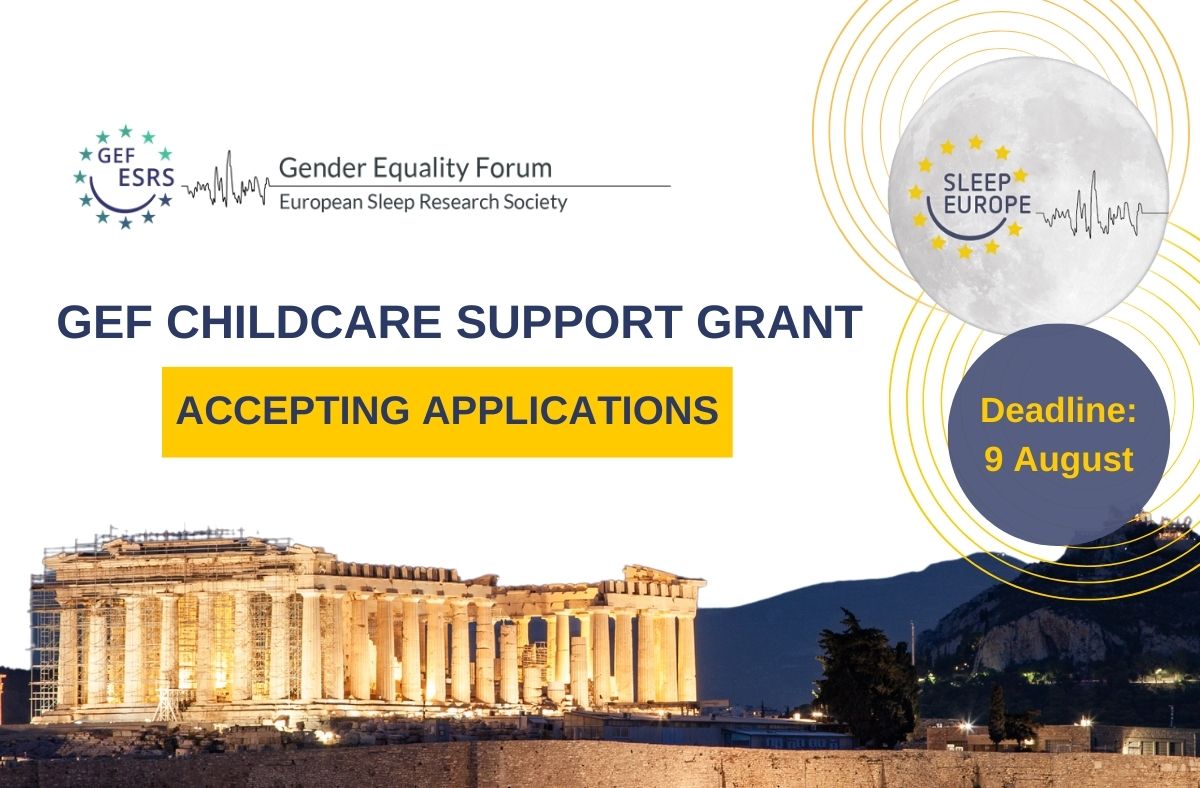ESRS GEF Childcare Support Grant
Participating at conferences is a crucial part of every researcher’s academic work. Parent-researchers face additional challenges to fully participate in conference activities due to their childcare-responsibilities. This creates disadvantages for parents and can lead to future career barriers, especially for women (Calisi et al. (2018). The ESRS strongly believes that inclusion and diversity are key factors for innovative and cutting-edge science. Therefore, the ESRS is committed to create solutions and reduce hurdles for parents to remain active in sleep science.
The Gender Equality Forum (GEF) is excited to announce that the ESRS will award for the first time the “ESRS GEF Childcare Support Grant”. This grant has the aim to provide financial support to parents covering childcare on-site or at home to enable physical attendance at Sleep Europe 2022 in Athens, Greece. The benefit of this grant is its flexibility so parents can choose to put the money toward a trusted caregiver at home or bring this person with them to Athens.
Calisi et al. (2018) puts forward a CARE framework regarding the childcare-conference conundrum. This framework provides four concrete suggestions for how to support parents. “When conference organizers consider parental needs, everybody wins. Offering childcare, accommodating families, providing appropriate resources, and establishing a parent social network are all ways that organizations can show they CARE.” The ESRS GEF, took on board the CARE recommendations when developing this grant and critically evaluating what can be done to make our meeting more inclusive.
Here is how the ESRS will show how we CARE at Sleep Europe 2022:
Childcare
Through this new grant, Sleep Europe 2022 attendees will be able to participate knowing their child is being cared for, whether at home or in Athens. This will enable primary caregivers attending the congress to fully immerse themselves in the programme, worry-free. Based on the demand and responses received, ESRS may consider to host onsite child care at future conferences.
Accommodate Families
While children are prohibited from attending the industry exhibition due to regulations, babies and children outside of the area where badges are required are acceptable. Additionally, baby wearing at a session or poster session would be fine provided the baby is not overly disruptive.
Resources
Facilities will be made available for a lactation space to pump or nurse. However, we kindly request that anyone who would need access let us know in advance of the conference so we can be sure we are able to accommodate individual needs.
Establish a Parent/Caregiver Social Network
The GEF is in the final stages of establishing the group’s presence on social media. Once this is complete, it will be shared with everyone. If there is demand for a parent-specific discussion group, there is the ability to develop this space for exchange.
All ESRS members, parents or not, are encouraged to actively engage in GEF activities and consider joining the forum. Not just early career, female or primary caregivers can benefit from participation, but the GEF needs advocates and allies to support their efforts to create a culture of inclusivity and gender equality within the ESRS, provide training opportunities and developing strategies to stop the ‘leaky pipeline’ of women and minoritized gender identities leaving research.
Grant Application
If you are interested in childcare support while you attend Sleep Europe 2022, we encourage you to read the eligibility guidelines and application procedure carefully. The deadline to apply is 9 August 2022. We look forward to receiving your application and seeing you (and maybe your little ones) in Athens, Greece soon.
ESRS Reminders
Sleep Europe 2022 Late Breaking Abstract Submission
We are currently accepting submissions for late breaking abstracts. These abstracts should contain data or relevant information that was not yet known or available by the normal submission deadline (26 April 2022).
Deadline: 16 August 2022
More details here.
Sleep Europe 2022 Regular Registration
The ESRS Board is pleased to announce that regular registration is now open for Sleep Europe 2022 in September in Athens, Greece. We look forward to seeing you there in-person for an exciting programme including new teaching courses, more keynote speakers than ever before and numerous sessions based on our six educational tracks.
Deadline (Regular Registration): 30 August 2022
View the entire scientific programme and register today.
Sleep & Health Webinar – Save the Date
Save the date for the upcoming Sleep & Health webinar to be hosted on Tuesday, 22 July 2022 at 17:00 – 18:00 CEST. This will be chaired by Prof. Dr. Claudio Bassetti, where he will also be joined by Prof. Drs. Tiina Paunio and Dirk Pervernagie. Register today!
Become More Active in the ESRS
The Sleep Medicine Committee is seeking an effective member to fill the position of Chair for the committee. This is one of our largest and most productive committee’s, with four working groups dedicated to promoting clinical sleep medicine as its own healthcare discipline.
Deadline: 15 August 2022
More details here.
The ESRS Board invites you to submit nominations for members of the 2022 – 20224 ESRS Board and Scientific Committee. This is an excellent way in which you can get more involved in the society and contribute in an even greater way to the sleep science field.
Deadline: 14 September 2022
More details here.
Recent publications from ESRS members
- Mutti et al. (2022). Clinical characteristics of a large cohort of patients with narcolepsy candidate for pitolisant: a cross-sectional study from the Italian PASS Wakix® Cohort. Neurol Sci.
- Heremans et al. (2022). From unsupervised to semi-supervised adversarial domain adaptation in electroencephalography-based sleep staging. J Neural Eng.
- DelRosso et al. (2022). Restless Sleep Disorder (RSD): a New Sleep Disorder in Children. A Rapid Review. Curr Neurol Neurosci Rep.
- Borsky et al. (2022). Toward Sleep Study Automation: Detection Evaluation of Respiratory-Related Events. IEEE J Biomed Health Inform.
- Mykland et al. (2022). Sleep restriction alters cortical inhibition in migraine: A transcranial magnetic stimulation study. Clin Neurophysiol.




